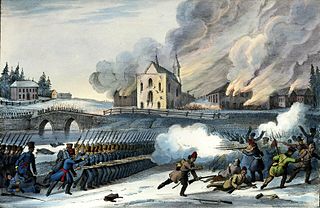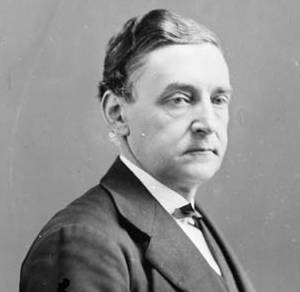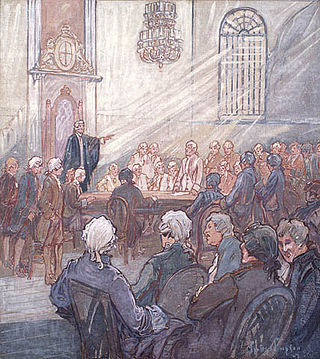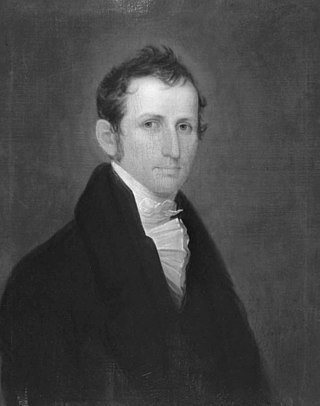Footnotes
- ↑ "Biography". Dictionnaire des parlementaires du Québec de 1792 à nos jours (in French). National Assembly of Quebec.
Edward Barnard was a politician from Quebec, Canada and a Member of the Legislative Assembly of Lower Canada. [1]
He was born around 1806. A son, Édouard-André Barnard, gained some notability as a militia officer in Lower Canada.
He ran as a Patriote candidate in the district of Trois-Rivières in 1834 and won. His tenure came to an end on March 27, 1838 when the constitution that ruled the colony was suspended.
He was arrested in November 1838 for his involvement in the Rebellions of 1837 and put in jail in Montreal, but was released in December of the same year.
Barnard eventually made a career as a clerk of court in the Mauricie area and retired in 1878. He died in the United States in June 1885.

Sir George-Étienne Cartier, 1st Baronet, was a Canadian statesman and Father of Confederation. The English spelling of the name—George, instead of Georges, the usual French spelling—is explained by his having been named in honour of King George III.

The Lower Canada Rebellion, commonly referred to as the Patriots' War in French, is the name given to the armed conflict in 1837–38 between rebels and the colonial government of Lower Canada. Together with the simultaneous rebellion in the neighbouring colony of Upper Canada, it formed the Rebellions of 1837–38.

Pierre-Joseph-Olivier Chauveau was a Canadian lawyer and politician. Chauveau was the first premier of Quebec, following the establishment of Canada in 1867. Appointed to the office in 1867 as the leader of the Conservative Party, he won the provincial elections of 1867 and 1871. He resigned as premier and his seat in the provincial Legislative Assembly in 1873.

This section of the Timeline of Quebec history concerns the events in British North America relating to what is the present day province of Quebec, Canada between the time of the Constitutional Act of 1791 and the Act of Union 1840.

Wolfred Nelson was the mayor of Montreal, Quebec, from 1854 to 1856.
A member of Provincial Parliament (MPP) is an elected member of the Legislative Assembly of the Canadian province of Ontario. Elsewhere in Canada, the titular designation "Member of Provincial Parliament" has also been used to refer to members of the Legislative Assembly of Lower Canada from 1791 to 1838, and to members of the Legislative Assembly of Quebec from 1955 to 1968.

Sir Antoine-Aimé Dorion was a French Canadian politician and jurist.

The Legislative Assembly of Lower Canada was the lower house of the bicameral structure of provincial government in Lower Canada until 1838. The legislative assembly was created by the Constitutional Act of 1791. The lower house consisted of elected legislative councilors who created bills to be passed up to the Legislative Council of Lower Canada, whose members were appointed by the governor general.
The Legislative Council of Lower Canada was the upper house of the bicameral structure of provincial government in Lower Canada until 1838. The upper house consisted of appointed councillors who voted on bills passed up by the Legislative Assembly of Lower Canada. The legislative council was created by the Constitutional Act. Many of the members first called in the Council in 1792 had served as councillors in the Council for the Affairs of the Province of Quebec.

George Barnard Baker was a Quebec lawyer and political figure. He was a Liberal-Conservative member of the House of Commons of Canada representing Missisquoi from 1870 to 1874, from 1879 to 1887 and from 1891 to 1896 and in the Legislative Assembly of Quebec from 1875 to 1878. He was named to the Senate of Canada for Bedford division in 1896 and served until his death in 1910.
Joseph-Guillaume Barthe was a lawyer, journalist and political figure in Canada East. He also wrote for the Montreal newspaper Le Populaire under the pseudonym Marie-Louise.

Henry Black, Q.C., LL.D. (hon.c.) was a lawyer, political figure, and judge in the Province of Canada. He was the judge in the Court of Vice-Admiralty for the Quebec City district for most of his adult life. During that time, he was briefly a member of the Special Council which governed Lower Canada following the Lower Canada Rebellions of 1837 and 1838. He also served one term in the Legislative Assembly of the Province of Canada, as a member for Quebec City.
Amable Berthelot was a Canadien lawyer, author and political figure. He was elected to the Legislative Assembly of Lower Canada and later to the Legislative Assembly of the Province of Canada. Trained as a lawyer, he was an avid book-collector, at one point having a personal library of some fifteen hundred volumes. He did not support those who took up arms during the Lower Canada Rebellion of 1837–1838. He never married, but adopted two children, a boy and a girl. His daughter married Louis-Hippolyte LaFontaine, later co-premier of the Province of Canada. He was a literary mentor to François-Xavier Garneau.
Jean-Moïse Raymond was a businessman, militia officer and political figure in Lower Canada, and briefly in Canada East, in the Province of Canada. He was active in a family business inherited from his father, and also served in the Lower Canada militia during the War of 1812, at the Battle of the Châteauguay. As a member of the Legislative Assembly of Lower Canada, he was critical of British government of the province, voting in favour of the Ninety-Two Resolutions, which set out a detailed list of problems with the government. He opposed the union of Lower Canada with Upper Canada. Following the union of those two provinces into the Province of Canada, he was elected to the Legislative Assembly of the new province, but resigned his seat after only one year to take a government appointment. He died in 1843.

George Okill Stuart was a Canadian lawyer, political figure, and judge.
The Special Council of Lower Canada was an appointed body which administered Lower Canada until the Union Act of 1840 created the Province of Canada. Following the Lower Canada Rebellion, on March 27, 1838, the Constitutional Act of 1791 was suspended and both the Legislative Assembly and Legislative Council were dissolved.
Philippe Panet was a lawyer, judge and political figure in Lower Canada.

Andrew Stuart was a lawyer and political figure in Lower Canada.

Sir François Langelier, was a Canadian lawyer, professor, journalist, politician, the tenth Lieutenant Governor of Quebec, and author. He was born in Sainte-Rosalie, Lower Canada and died in Spencer Wood, Sillery, Quebec.
William Baker was a businessman and political figure in Lower Canada. He represented Missisquoi in the Legislative Assembly of Lower Canada from 1854 until the suspension of the constitution in 1838.